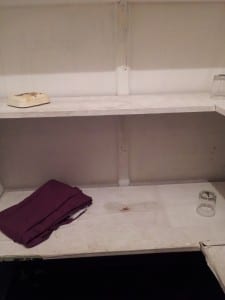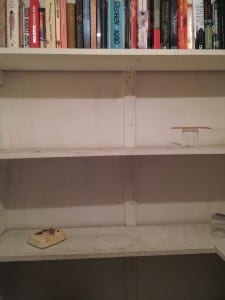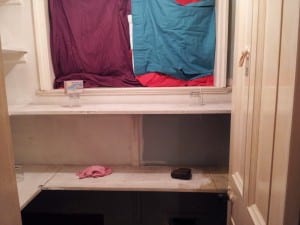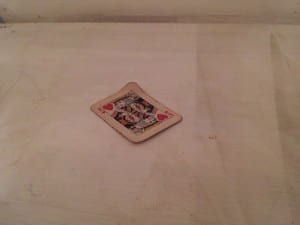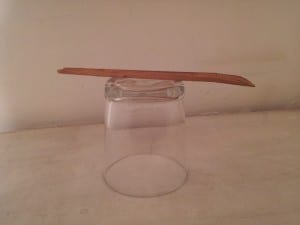That was, in a word, exhausting.
I know I shouldn’t complain and I know that everyone was in a similar state to me (or worse if their piece was durational), but performing each night was extraordinarily draining. That’s not to say it wasn’t deeply satisfying. Looking over my previous posts, I don’t think I ever precisely outlined the terms of my performance, so I’ll elaborate, now that there’s nothing to spoil for the public.
I was the Blind Curator, a tragi-comedic character – this is a man who lives in abject squalor, in a crumbling room, barely large enough for another person to be in there with him. His ‘collection’ is a banal one – everyday objects, often in a state of disrepair are carefully displayed on the shelves of his room. Here are some of them now:
A thoroughly uninspiring collection, aren’t they?
But just as the audience think that this room is full of worthless items, of no value, the Curator opens mind to them. To his blind eyes, they are treasures, artifacts. They all speak of places unfathomably far away, even if that place is the one he is in now. Suddenly, to the audience members who choose to engage and see these objects through his mind’s eye, they are amazing, they are beautiful, they are ancient and powerful and magical. Those who visit the Blind Curator’s gallery are swept away to worlds of fantasy and imagination, if they let themselves be.
The piece was designed with a basis in the idea of ‘make strange’ that Gob Squad displayed in their office performance (n.d.). I had gathered from around the house (and some objects from the wider world) objects that were, if we’re being brutally honest here, junk. I collected this rubbish and put it on display. But then I freed it. By being blind, I was able to experience these objects with something other than my eyes. And they spoke to me – they told me to lie. The concept of how long one has to have inhabited a space to lie about it was one of the concepts I’ve toyed with and in this case, not only the space became fictional, so did these objects. I weaved narratives around them, dressed them in mythology, gave them new pasts, new futures and ultimately was a liar. But the audience was given a choice – not obviously, but subconsciously. Would they see my narratives as absurd, watching this blindfolded man witter on about what was patently not true? Or would they allow themselves to believe the lie, just for a little while? Unfortunately, due to my blindfolded state, I couldn’t see this decision play out on the faces of the audience, but I could get a sense of how engaged people were in my tales and, for the most part, the audience wanted to believe.
One of the most interesting things I find, looking back at performance, was the unpredictability of the audience. I was particularly bemused by some of the choices that the audience members made when it came to choosing objects to listen about – here’s a tally:
Lock: 7
Mirror: 8
Stone: 3
Cloth: 3
Keyhole: 10
Jack: 8
Curtain: 2
Cardboard: 2
Soap: 8
Bolt: 4
Box: 5
Key: 6
Alarm: 5
Queen: 2
Splinter: 12
Book: 8
King: 0
The Unloved King
The Bizarrely Popular Splinter
Still now, I cannot fathom the popularity of that sliver of wood, it puzzles me and makes me second guess the understanding I thought I had of people. I even experimented with changing its positioning yet still it was chosen repeatedly.
Aside from my bafflement regarding that, the whole performance went off without any trouble (with the exception of one woman who wasn’t tall enough to reach up and trace the cracks of the ceiling with me) and was a deeply satisfying experience. While I’ll not miss my time in the gallery, as in was often cold and always cramped and uncomfortable, I shall look back on it fondly and always try to remember the narratives I wove for it.
References:
Govan, n.d. Revisioning Space, The Place of the Artist, [e-journal] P. 123, Available through: Lincoln University Blackboard: http://blackboard.lincoln.ac.uk.
